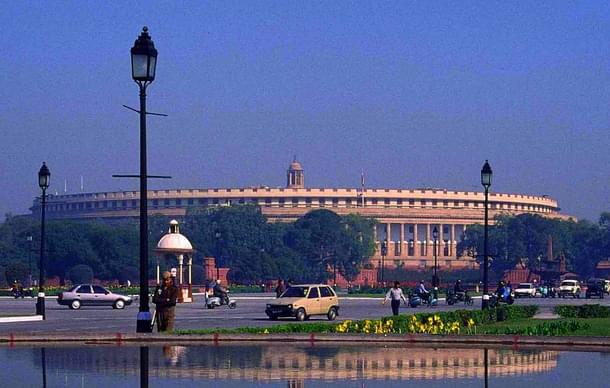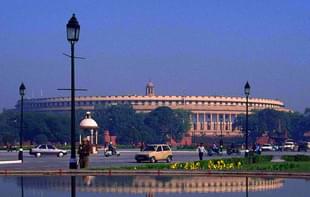Politics
The Real Reason Why The Opposition is Stalling Parliament
Praful Shankar
Dec 22, 2014, 04:41 PM | Updated Feb 10, 2016, 05:47 PM IST
Save & read from anywhere!
Bookmark stories for easy access on any device or the Swarajya app.


The passage of key bills in the Winter Session along with a truly reformist Budget early next year would have put the Modi government’s development agenda fully on track for the remainder of this term. And that is exactly why the Opposition is stalling the Parliament.
When Barack Obama was elected as the President of the United States in November 2008, the entire world viewed his election as one of the most defining moments in recent US history. The Obama mandate was powered by a unique and energetic campaign centered around hope and change, drawing its energy from a never-seen-before engagement of young people across the country. Obama was expected to be the man who would mend a broken America, by lifting a crumbling economy to previously-seen, soaring heights while also restoring America’s standing in the global community.
Six years on, the US economy seems to be slowly inching towards better days – with unemployment at its lowest since the financial crisis of 2008 and GDP growth trending upwards. Obama’s cerebral and measured approach to foreign policy – although heavily criticized by his political opponents – also seems to be delivering the President slow but credible strategic benefits.
Yet, in sum total, the perception has been that the Obama Presidency has not – for the moment, at least – lived up to its billing. While President Obama has managed to draw out key wins for his Administration, the transformation that most of his supporters expected when they elected him has not quite materialized. One of the major reasons for this has been the obstructionism that Obama has faced from the Republicans in US legislative bodies. Faced with an opponent with immense public support post his rise to office, the Republicans decided to use Obama’s greatest strength against him – soaring public expectations. Using almost every old trick in the political book – from spreading ‘creatively’ crafted information to obstructing legislation – the Republicans managed to create a perception of inaction and pessimism around the President, eating away at his public popularity.

After watching the developments in the Rajya Sabha for the past two weeks, it would seem that the India’s Opposition parties seem to have learnt a trick or two from their American counterparts.
The Winter Session was always going to be a crucial one for the Modi government. It was expected to set the foundation for the government’s economic agenda. The government had given indications that it planned to go ahead with reformist legislation on which it had managed to gather bi-partisan support like the Insurance Bill and the Coal Block Allocation Ordinance. The Finance Minister had also begun the process of consultations around the GST Bill, another piece of critical economic legislation with the potential of adding 1%-2% to the national GDP.
The passage of key bills in the Winter Session along with a truly reformist Budget early next year would have put the Modi government’s development agenda fully on track for the remainder of this term. It would also have given the government time and space to work on tougher pieces of legislation, like the proposed amendments to UPA’s Land Acquisition Bill, in the coming months.
Hence, the Opposition seems to have realized that if there ever was a time for disruption, it is now. This is the reason why the Upper House of the world’s largest democracy has seen disruption of the most ridiculous kind over the past two weeks. If it is the statements of a Minister one day, it is religious conversions on another. Aided by a cooperative left-leaning media, which seems to have suddenly woken up to the fact that people do switch religions in India, the Opposition has decided that the interests of India are best served by stonewalling any sort of developmental agenda over their favorite subject – secularism.
As anyone who observed the General Elections would remember, the core of all opposition to Modi during the election was the theme of secularism and the leftist ‘Idea of India’. The poll results of May emphatically demonstrated that this is a non-issue for most Indians. As the Opposition would very well know, watching Parliamentarians mouth half-earnest platitudes and clichés on this subject while obstructing legislation is not going to change this fact.
The electorate for whom Narendra Modi is not palatable because of his so-called ‘communal’ leanings is already on the Opposition’s side. There are no votes to be won there.
But there are votes to be won amongst the electorate that voted for Modi because they believed in his ability to deliver development and good governance. By obstructing Modi’s momentum towards economic reform, the Opposition expects to engulf him with the same kind of cynicism that the Republicans managed to shroud Obama with.
This is where Indian will need Prime Minister Modi to be different from President Obama.
During the early days of his presidency, Obama wasted valuable time and political capital chasing the mirage of bi-partisanship and negotiating with a bullish Opposition who had made up their mind to simply reject any offer he came to the table with. The Opposition parties in India seem to be following instructions from the same rule book.
This is exactly where India would want the Prime Minister to unleash the same ruthless streak that he demonstrated as the Chief Minister of Gujarat and the Prime Ministerial candidate of the BJP. Modi’s track record in Gujarat and his ascent to power in New Delhi have both been marked by his willingness to never shy away from a tough fight. Over the coming months, the country needs him to replicate the same verve and audacity in pushing through key legislation in the face of, what is expected to be, an unreasonable Opposition.
A large part of the voter’s fatigue with Manmohan Singh was the inertia he exhibited even when it came to pushing through reform that had popular support. Dr Singh’s feebleness was seen in stark contrast with the energy and determination of Narendra Modi, who – as the Gujarat Chief Minister – seemed to be ready to do what it takes to get the job done.
Signs are that the Government has already realized that the way forward is unlikely to be built by consensus. The Finance Minister has indicated that the government will look to table the GST Bill this session and that the Ordinance route is an option if the Insurance Bill continues to get delayed. One suspects that this will be the first of many such alternative options which the government will have to pursue until the numbers in the Rajya Sabha change for the better.
If the government does manage to avoid the temptation to be overtly statesmanlike and pushes through key economic legislations over the next two Parliament sessions, not only will it set the country on the path to true economic reforms, it will also send out two clear messages.
The Opposition will have realized that it will have to battle the government on the strength of their ideas rather than the shrillness of their voices. More importantly, it would assure the public that Narendra Modi is very much the same man they thought he was when they chose him as their Prime Minister.
Praful Shankar is a political enthusiast and tweets at @shankarpraful.





